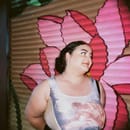Jennette McCurdy’s memoir I’m Glad My Mom Died has been one of myーand probably yourーmost anticipated reads of the year. Waiting for months on end for Jennette to release her controversially titled book was agonizing, but as soon as I got my hands on a copy, reading it was equally so. My entire childhood was spent watching iCarly on Nickelodeon, so having a tell-all from Jennette herself was something that I knew I needed to support. After alleged claims of the creator of the series Jennette starred on for years, the whole world has been curious about the truth of the situation. The book features a string of trigger warnings for things such as eating disorders, death, suicidal ideation, and sexual assault, which is why I will be breaking it down for those of you who can’t bring yourself to read the book itself. If you do, however, plan on reading the book, this is your warning of huge spoilers ahead!
The Beginning
The book begins with context on Jennette’s life during her childhood, including her tumultuous start to acting. Long story short, her mother’s lifelong dream was to become an actress as a kid. Because she couldn’t break through, she put Jennette into acting classes and lived vicariously through her for the rest of her life. She even threw a fit when Jennette told her she wanted to quit acting at the beginning of her career. Anyways, this first part of the book narrates all of Jennette’s childhood acting experiences and her journey from being a background extra to auditioning for iCarly. She talks about the immense pressure she felt as the sole breadwinner for her low-income family of 7, and the estranged relationship she had with her father because of her own codependent relationship with her mother.
This first part also introduces Jennette’s struggles with mental health, including how she started to restrict her caloric intake, which would consequently lead to two different eating disorders. Jennette was introduced to calorie restriction at just 11 years old. After getting her first period and feeling a little bloated, Jennette went to her mother concerned about her “weight gain” and was advised to count calories to remain at 85 pounds for as long as she could!
This part of the book also highlighted her Mormon faith, which her mother used as another means of control by restricting her social interactions with both non-religious individuals and people of the opposite sex. This book is told from a first-person perspective, so when reading these things, it feels like you, the reader, are actually living through them alongside Jennette. Suffice it to say that accounts of her mother bathing her daily until the age of 18 and performing “body checks” on her made me sick to my stomach and were incredibly hard to read.
The Middle
After booking the role of Sam Puckett in iCarly, Jennette still lived under the reign of her abusive mother. However, she was beginning to feel curious about life outside of what her mother told her to believe. At this point, iCarly had been picked up and while she hated playing her character, she had found solace in her costar, Miranda Cosgrove. Miranda was a light in Jennette’s life, showing her friendship for the first time (due to Jennette having been homeschooled for her entire life). Her mother disapproved of Miranda because she didn’t believe in God. Despite advising Jennette to stay away from her, the two remain close friends up to this day.
As the show progresses, Jennette is getting older, and her body is changing. She recounts how the stylists for iCarly made it so that her character was always clothed in various layers to hide her growing body, which only fueled her anorexia at the time. In order to maintain a childlike appearance for longer, the calorie restriction became even more prevalent in her mind. While all of this was happening, Jennette recounts her experience with The Creator (allegedly, Dan Schneider) and how he was just as emotionally abusive to her as her mother. The Creator allegedly forced Jennette into wearing a bikini top despite her being uncomfortable with it, forced her to kiss her costar, Nathan Kress, for the show, edged her to drink alcohol while underage, yelled at her, and then later love-bombed her, and gaslit her into thinking that she would get her spin-off show, but only if she behaved and went along with everything that he ordered.
During this time, and unbeknownst to her over-controlling mother, Jennette had started dating a script manager for the show who was 9 years her senior. After a trip with her then-boyfriend, paparazzi pictures leaked of the two, which led to her mother sending her a nasty email where she practically disowned her daughter and asked for money in the same breath. This is a real turning point for Jennette’s relationship with her mother, as she later decides to move from her house into her first apartment. Despite Jennette’s effort to achieve some independence, her mother moved into Jennette’s new apartment once her cancer came back.
The End
At the end of iCarly, as mentioned before, The Creator promised to give Jennette her spin-off show. Needless to say, that wasn’t the case, as another rising star was promised the same things. And so, Sam and Cat was born. During this time, Jennette’s mother’s cancer had come back; a circumstance that her mother weaponized as a means to manipulate Jennette into being under her reign once again. On top of all of this, she had Sam and Cat, and her very valid ill feelings of comparison and competition that she felt toward her costar were manifesting into her everyday struggles with alcohol and eating disorders. The only reason she agreed to do Sam and Cat, was that she was promised the opportunity to eventually direct an episode of the show. Not surprisingly, and to Jennette’s dismay, The Creator completely blindsided her and she was never able to direct the episode.
During the time of her mother’s death, Jennette was wrapping up her acting career at Nickelodeon while completely oblivious to the extent of the abuse she had endured at the hands of her mother. While in therapy for her eating disorders, Jeannette was prompted with questions about her mother and refused therapy until she could properly process the things that her mother had put her through. It wasn’t until several years later that Jennette could understand her childhood trauma and its consequences, process the emotional damage her mother’s abuse had inflicted, and truly begin her healing journey.
I skimmed through a lot of what Jennette discusses in her book in this article due to the weight of her trauma, but this doesn’t capture the horrifying reality contained in I’m Glad My Mom Died. I felt the weight of this book weeks after I had flipped that final page. I don’t think I will ever be able to enjoy an episode of iCarly ever again after finding out the truth. The explicit nature of the progression of her eating disorder and her recounting her sexual trauma was extremely triggering, even for someone like me who’s not usually affected by sensitive subject matter. Although I believe this book is extremely well written, I do wish it was told in the third person instead of the first. That way, we could get some input from who Jennette is now. Regardless, I find it inappropriate to rate something so vulnerable and raw on a 5-star scale, so I will leave you with this: it was the best book I’ve read all year. Happy reading!


